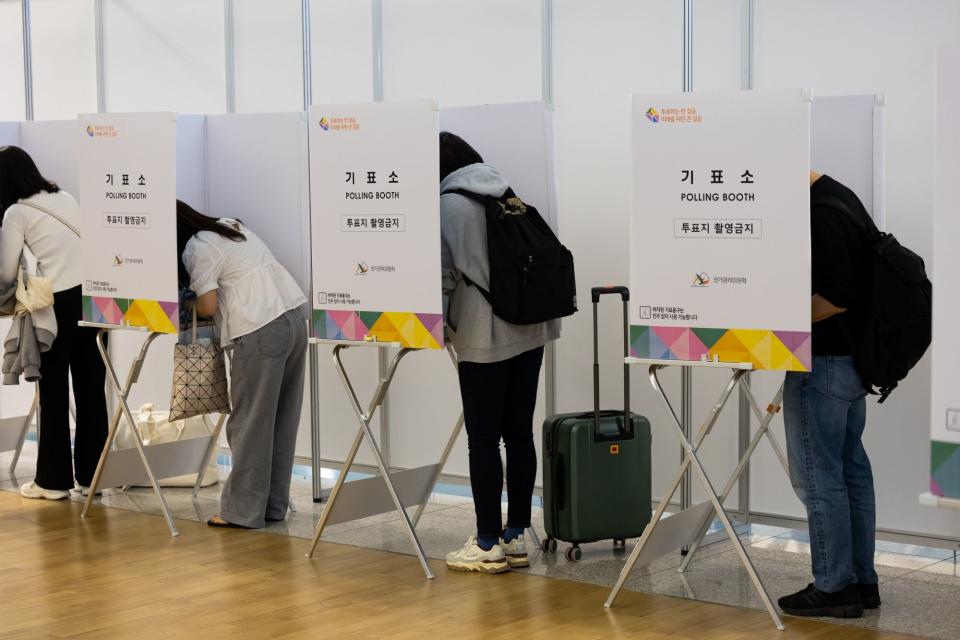A Trader’s Guide to Navigating South Korea’s Parliament Election
(Bloomberg) -- South Koreans head to the polls next week to elect a new parliament and the outcome may threaten the government’s Japan-like corporate reforms that have helped spur a stock market rally.
Most Read from Bloomberg
Saudis Scale Back Ambition for $1.5 Trillion Desert Project Neom
Iran Tells US to Step Aside as It Readies Response to Israel
Mark Zuckerberg’s Wealth Exceeds Elon Musk’s for the First Time Since 2020
NY Area Rattled by 4.8 Magnitude Quake, Followed by Aftershock
The results of the April 10 vote to select the 300 members of the National Assembly could undermine President Yoon Suk Yeol’s flagship policy of boosting stock valuations via the “Corporate Value-Up” program, along with a number of his other reform measures.
Stocks and the won have already started to retreat in recent weeks amid concern the left-wing opposition will score a major victory over Yoon’s ruling party. An opposition victory already appears the most likely outcome. The odds of the ruling party gaining a majority in the vote is just 20%, according to economists at Citibank Korea.
“I plan to wait and see the results of the elections” before buying, said Jae Lee, chief investment officer at Timefolio Asset Management SG Pvt in Singapore. “It’s not too late to pick stocks after confirming that the government and the regulators show strong commitment to the reform” following the election, he said.
President Yoon, who took office in 2022, is aiming to replicate Japan’s success with corporate reforms that have propelled its stocks to record highs. His plan is to offer tax incentives to encourage listed firms to improve their valuations, a measure that requires parliamentary approval. The Value-Up program has already helped lure record quarterly foreign inflows to Korean stocks, which have also supported the won.
Here are some areas traders will be watching as the election takes place:
1. ‘Value-up’ and Tax Cuts
A key plank of the Value-Up program is to provide tax incentives for those firms that put in place measures to enhance shareholder returns. Levies that may be cut include dividend income tax, corporate tax, and inheritance tax.
That agenda may face increasing resistance if the opposition wins big.
“A left-wing dominant National Assembly could be less cooperative on tax incentives” for the Value-Up program as they are likely to be deemed as a tax cut for the wealthy, Citibank economists including Jinwook Kim in Seoul wrote in an April 1 report.
Without the tax incentives, the Corporate Value-Up program would lack much of the driving force that is necessary to make it successful, Bank of America economists wrote in a research note last week.
2. Fate of the Capital Gains Tax
Another of Yoon’s policies that may be imperiled in the election is the president’s desire to abolish the planned capital gains tax on income from financial investments.
Yoon in January pledged to scrap the planned tax — which is set to be introduced next year — in a bid to boost investor sentiment and stock values.
The government had earlier agreed to delay the planned tax by two years from its original 2023 implementation date. The proposal would impose a levy of at least 20% on income from investments such as stocks, bonds and mutual funds if annual capital gains from them exceeds 50 million won ($37,000).
The main opposition Democratic Party wants to push ahead and introduce the tax.
3. Currency Market Reforms
Yoon’s government is also seeking to extend trading hours for the onshore won as part of efforts to improve investors’ access to the local market — a move that could help get Korean bonds and stocks included in more global indexes and thereby encourage greater foreign inflows.
Pilot tests are being conducted ahead of the official extension of the won’s trading hours slated for July.
Some analysts say one of the key things to watch for after the election will be how the new parliament perceives these reforms.
“For me and the market, the most important thing is the government’s resolve to push forward with the market reforms and FX liberalization,” said Wee Khoon Chong, senior Asia Pacific market strategist at BNY Mellon in Hong Kong.
4. Buy Election Volatility
The uncertainty surrounding the election is expected to increase volatility, but it may also provide a buying opportunity, some investors say.
A decisive left-wing victory may see a pullback in stocks, especially those that have seen big gains on expectations for the “Value-up” program.
If stocks fall, there are a “large number of investors with the belief that the Value-Up program will continue, with or without legislative support, and willing to buy into weakness,” Bank of America analysts including Joon-Ho Lee and Jeehoon Park wrote in an April 1 research report.
Peter Kim of KB Securities Co. agrees.
An election win by the opposition should not scare away investors or change the long-term direction that the Korean government is trying to take, said Kim, Seoul-based head of global markets at KB.
Possible weakness in the won after the election may also be seen as a buying opportunity.
Any election shock is likely to be short-lived, BNY Mellon’s Chong said. “I like the won the most” out of all emerging Asian currencies in the second quarter as it’s expected to be supported by “strong foreign inflows and tech export recovery,” he said.
South Korea’s stock market will be shut April 10 for the election, and resume trading the following day. There has not been any announcement yet on any close for the currency market.
--With assistance from Jon Herskovitz.
Most Read from Bloomberg Businessweek
How Bluey Became a $2 Billion Smash Hit—With an Uncertain Future
China’s Real Estate Tycoons Lost $100 Billion in the Housing Collapse
©2024 Bloomberg L.P.




